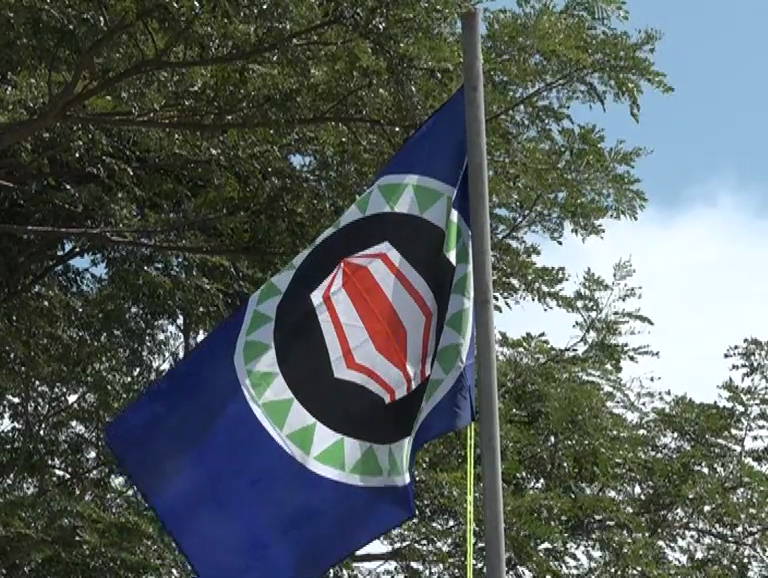BRISBANE, 16 JULY 2109 (SBS) — Australia could soon have a new country as a neighbour when the Papua New Guinea province of Bougainville votes in an independence referendum later this year. It comes three decades after the start of a bloody civil war on the island that claimed thousands of lives and saw many flee overseas.
The referendum, currently due in October, will ask Bougainville people if they should have greater autonomy from PNG or full independence.
The overwhelming mood among the hundreds living in Australia appears to be voting “yes” to turning their province of just over 300,000 people into its own nation.
“I’m the first person to register here in Brisbane and I’m so excited, I’m pumped to vote for independence for Bougainville, so I’m ready,” said Junior Novera, who lost family during the “crisis”.
Novera is now an environmental scientist studying for his PhD in Brisbane.
Bougainville first unsuccessfully tried to declare sovereignty in September 1975, just before PNG independence from Australia.
“We’ve always been different, I think we’ve always felt we should have been part of Solomon Islands and they drew the line in the wrong place,” said teacher aide Martha Karol, who fled overseas in 1990 when she was 16 and rape was being used as a weapon of war.
Bougainville’s civil war erupted 31 years ago, when landowners revolted over the lack of direct benefits and the environmental damage from the world’s largest copper mine on their island, run by Rio Tinto. The Panguna mine has not reopened since.
“The riot squad turned up on a Sunday morning in our village firing guns, the choppers came, they burnt down all the houses, they beat up the men. It was scary,” Karol said.
“They were looking for guns and supporters of the BRA [Bougainville Revolutionary Army].”
Three decades on from the PNG government forces using Australian-supplied helicopters to fight the BRA and target civilians, foreign minister Marise Payne visited last month and offered help.
“I don’t think the exercise of a democratic process in one of our nearest neighbours would be described as a huge problem for Australia,” Payne told the ABC.
“The important things that Australia is focused on is not forming a view one way or the other on the outcome of a referendum in another country, but importantly supporting that wherever we can to ensure a credible, and a peaceful and an inclusive process.”
Former Irish prime minister Bertie Ahern, who helped broker peace in Northern Ireland, has been appointed referendum commissioner and visited Bougainville last week.
Ahern flagged the October date may now need to be delayed until November to ensure domestic and International voter registration is completed and to finalise other preparations.
“I can tell you this will be finished in the year 2019 and a decision will be made but to do it the way people are asking me and requesting me I need time,” Ahearn said.
Any decision to delay must be agreed by both the PNG and Autonomous Bougainville governments.
“I was recently on Bougainville and no-one’s getting out to the remote communities, it’s still an issue and they should do more,” Novera said.
In Australia over the past week registration has been open only at the Brisbane and Cairns PNG consuls, and people travelled from across the country to enrol.
“A lot of people will probably miss out which is sad, very sad,” Karol said.
But Augusta Tagui, a university student in Brisbane who is too young to remember the civil war, says she is ready to help build a new country.
“I want to go back and help. I’m just here for education and experience and then I’m going back to help my homeland.”
“With the mining, the money was used to build other places like Port Moresby, the income left the island but if we get independence it will be us that’s in power and decides.”
Environmental scientist Novera’s research is on mining in Bougainville. He says he does not harbour resentment towards Australia for what happened in the past.
“Australia were the ones that were mining through Bougainville Copper Limited [BCL] and Rio Tinto and in the war supplying guns and helicopter, however, we shouldn’t have negativity,” he said.
“We should look at what role Australia can play, like me coming here for study as a Bougainvillean.”
Questions persist over the economic viability of Bougainville as an independent state, and also if the mine should reopen.
“The mine isn’t the only thing that can build up the economy,” Karol said.
“Because of the mine we’ve lost so many people to so much bloodshed, so there’re other things Bougainville can to do. We’ve got tourism, agriculture and fisheries.
“It’s going to be hard, but we’ve come this far so hopefully we’re going to get through it.”
The referendum result is non-binding and must be ratified by PNG parliament, but the country’s new prime minister James Marape has said he would prefer the province stay within PNG.
“Bougainville stands in our face as one of the most important agendas before our government and we will give our every best endeavour to ensure that Bougainville receives our support now and into the future,” Marape said in June when he swore in his new cabinet after taking office.
Not all weapons were surrendered during the New Zealand-led peace process in 1997 that gave Bougainville a measure of autonomy from PNG and paved the way for this referendum.
If Bougainville votes for independence but PNG’s parliament rejects the result, there are fears for what could happen.
“Going back to war, bloodshed, would be worst,” Novera, said.
“After seeing what happened in the late ’80s and ’90s, the suffering and death, hopefully we don’t go back,” he said.
Source: PACNEWS


